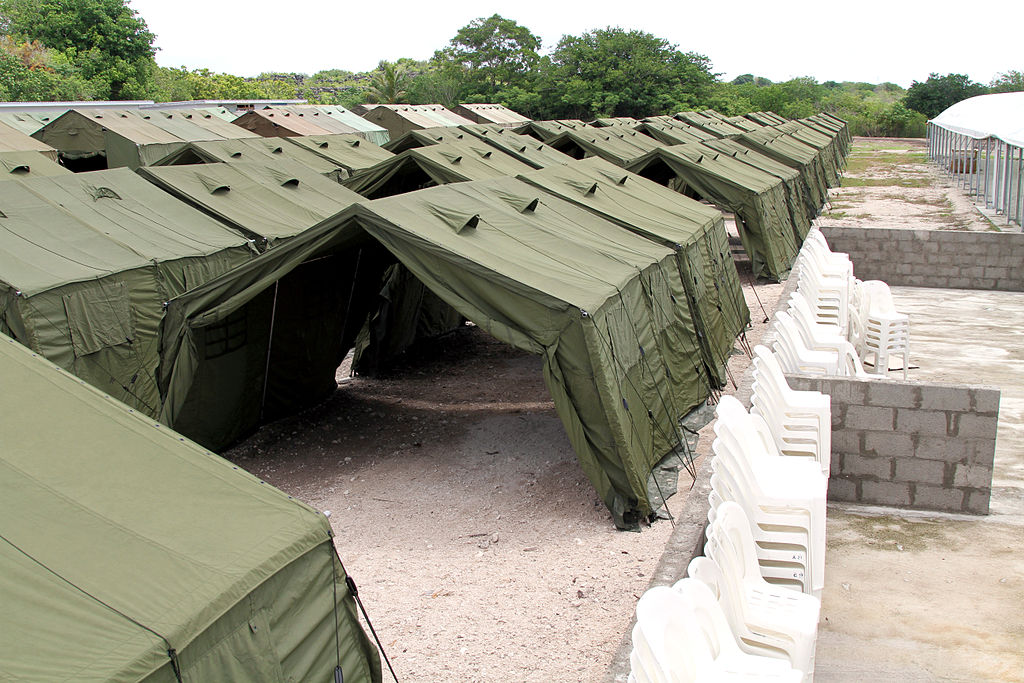The Ethics of Deterrence: Australian Offshore Immigration Detention
For over five years, the Australian Government has enforced a policy of not allowing asylum seekers or refugees attempting to reach its shores by boat to enter the country, and of ensuring that no persons who attempt to do so will be settled in Australia. Ever. As the government’s own disseminated advertising says: No Way. You will not make Australia home.
Boats carrying people seeking protection from Australia are escorted by the Border Force – a quasi military branch of the Department of Home Affairs, out of Australian territorial waters and either turned back to points of origin, for example in Indonesia, or taken to Australian-run immigration detention centres, officially called offshore processing facilities, such as those on the small Pacific island nation of Nauru. These facilities are tantamount to prisons where refugees, including families with children, are often held for years while they await processing and resettlement in third party countries.
The conditions in Australia’s offshore detention centres are notoriously abysmal. Reports of violence against detainees, often by privately contracted security guards, are routinely ignored. Vital medical treatments are refused or delayed. Many detainees suffer depression brought on by inhumane living conditions and exacerbated by the hopeless situation of indefinite detention. Self-harm is common. Over the years a number of detainees have died: from suicide, medical neglect, and violence. On June 15, a 26-year-old Iranian man committed suicide in his tent. He is the third asylum seeker to die by suicide on Nauru.
The Australian government attempts to maintain a high level of secrecy: journalists are effectively kept out and staff and other personnel are under injunctions not to disclose information about the centres. The government has consistently ignored calls from medical personnel, psychiatrists, trauma specialists, and the United Nations Human Rights Commission to end its offshore immigration detention.
The policy is designed to deter asylum seekers or refugees from trying to reach Australia by boat. The government claims success, in that it has ‘stopped the boats.’ A major justification given for turning back boats and keeping people in detention is that stopping the boats ultimately saves lives. The government claims that allowing refugees to settle in Australia who have arrived by boat encourages the illegal trade of people smuggling – so official justification for the policy is purportedly on ethical grounds: the illegal people smuggling trade puts lives at risk by arranging dangerous sea voyages on crowded, unsafe vessels, therefore the lives of refugees are protected when people smugglers can no longer operate because they have no product to sell.
Let us suppose for a moment that the policy can be assessed on its own merits.
There is, prima facie, an ethical issue of balancing harms. Different moral theories of course offer their own set of normative assumptions about what constitutes the right action, and the Australian Government’s defence of its policy is consequentialist in character.
A consequentialist (or utilitarian) theory doesn’t recognise the notion of duties and rights, instead holding that the moral action is that which minimises harm and maximises wellbeing. The moral action is the best possible outcome, quantified in terms of ranking and counting harms prevented and harms allowed. The right moral choice is that which ultimately maximises good consequences and minimises bad ones by balancing harms against benefits. For a utilitarian argument to succeed on its own terms, it has to show that the harms prevented are in fact worse than those allowed, and that remaining negative consequences are therefore worth the cost. Stopping asylum seeker deaths at sea is a desirable outcome, and stopping the boats has stopped them, but the cost is high, and it is far from clear that the justification is strong enough on consequentialist grounds.
The Australian Government’s consequentialist justification looks weak because it relies on an equivocation: a moral equivalence is tacitly assumed between actions that are designed to prevent harm (preventing refugee deaths at sea by stopping the boats) and actions which are actively causing harm (incarcerating refugees indefinitely in substandard conditions). It is one thing to allow certain harms to go un-ameliorated in order to prevent worse ones, but it is quite another thing to cause serious harm for the sake of a moral outcome.
Think of the famous ‘trolley-car‘ example, often used to illustrate the utilitarian moral framework. While many people would agree with the proposition that it is right to switch the car from being on track to kill five people to a track in which it will only kill one, fewer people would agree that it would be right to push one person off a bridge in front of the trolley in order to save the five people in its path.
In the Australian Government’s justification of its offshore detention policy, the latter (causing harm) amounts to sanctioning the idea that there are positive consequences from violence and deprivation. The consequentialist justification looks weak because in any (other) imaginable context, arbitrary imprisonment of innocent, vulnerable, and desperate people would be unconscionable. The end does not appear, in this case, to justify the means.
It is not even clear that the reasoning given for this policy can be assessed on its merits since there seems to be something morally suspect about the justification of what has now become a manifestly inhumane situation in ethical terms at all. So, the defense of detention on grounds of preventing deaths at sea may not just be a bad one, but may be itself immoral. Yet there are perhaps more serious moral problems with using asylum seeker detention as a deterrent, which appear to fall outside the Australian Government’s justification of its policy by being connected with the question of what moral duty Australia has to vulnerable people at its mercy and under its care.
According to a Kantian duty-based ethic, the most fundamental moral principle is to respect, and act in respect of, the humanity of other people. Using a principle derived from the acknowledgement of the intrinsic value of persons, Kantian ethics holds that we can know whether an action is moral by asking ourselves whether that action could be a universal law – whether it would be the right thing to do in respect of all persons in any situation regardless of consequences or context. This ‘test’ yields a philosophically objective form of the maxim to treat others as you would be treated. Kant called a moral duty so deemed a ‘categorical imperative’.
One such categorical imperative is that people must always be treated as ends in themselves, never used as the means to an end. In Kant’s formulation, “So act that you use humanity, whether in your own person or in the person of any other, always at the same time as an end, never merely as a means.” On this view it is immoral to treat someone as an object of merely instrumental value, because persons have an intrinsic (non-instrumental) value that the moral law demands we respect. In using detention and maltreatment of asylum seekers as a deterrent to others from attempting to reach Australia, the government is violating the moral duty to treat persons as intrinsically valuable, as ‘ends in themselves’.
Finally, the moral implication of Australia’s treatment of asylum seekers in offshore detention goes to the question of the moral character of the society. This policy is cruel and unusual, and the only possible reason for its continued enforcement is political. It has garnered significant enough acceptance in the Australian electorate to enjoy the support of both major political parties (the conservative Liberal Party currently in power, and the Labor Party, currently in opposition). Australia has extolled the ‘virtues’ of its ‘boat people’ policy to other countries.
However, asylum seekers trying to reach Australia by boat have broken no laws, and most have fled from unimaginably brutal situations into which they cannot safely return. Holding them indefinitely in despair and hopelessness as a deterrent is to be insensible to their humanity. And it is worth repeating the idiom that how we treat the vulnerable is a great moral test. The fiber of our moral character is at issue in how we respond to those who put themselves at our mercy and who turn to us for help. When a society begins to lose its capacity for compassion it begins to lose its moral bearings, and there is a real danger that its political dimensions too easily overshadow the moral dimensions of this debate.





